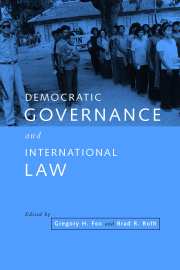Book contents
- Frontmatter
- Contents
- List of contributors
- List of acknowledgments
- Introduction: the spread of liberal democracy and its implications for international law
- PART I THE NORMATIVE FOUNDATIONS OF A RIGHT TO POLITICAL PARTICIPATION
- PART II DEMOCRACY AND INTER-STATE RELATIONS
- PART III DEMOCRACY AND THE USE OF FORCE
- PART IV DEMOCRATIZATION AND CONFLICTING IMPERATIVES
- PART V CRITICAL APPROACHES
- 17 Evaluating democratic progress
- 18 What kind of democracy does the “democratic entitlement” entail?
- 19 International law, democracy, and the end of history
- Index
18 - What kind of democracy does the “democratic entitlement” entail?
Published online by Cambridge University Press: 04 May 2010
- Frontmatter
- Contents
- List of contributors
- List of acknowledgments
- Introduction: the spread of liberal democracy and its implications for international law
- PART I THE NORMATIVE FOUNDATIONS OF A RIGHT TO POLITICAL PARTICIPATION
- PART II DEMOCRACY AND INTER-STATE RELATIONS
- PART III DEMOCRACY AND THE USE OF FORCE
- PART IV DEMOCRATIZATION AND CONFLICTING IMPERATIVES
- PART V CRITICAL APPROACHES
- 17 Evaluating democratic progress
- 18 What kind of democracy does the “democratic entitlement” entail?
- 19 International law, democracy, and the end of history
- Index
Summary
One of the very positive developments of the last several years in Latin America, Eastern Europe, parts of Central Asia and East Asia, and even Africa, has been the spread of democracy – or at least of elections, and the generalized requirement of elections – as the sole acceptable means of rule legitimation. It would be very dangerous, however, to view this trend as unidirectional – “the end of history” – or as the best we can do toward achieving the popular ideal of democracy. It represents, rather, a change in the nature, rules, and venues of the game of power competition that offers both new opportunities and new vulnerabilities. Over the longer term, the spread of elections has by no means been an unbroken trend; it has come in fits and starts, waves and cycles, incomplete and always subject to reversal.
The development or de-development of democracy (understood as popular, as opposed to elite, rule) should not be simply equated with or tracked through national elections. Elections are a means, not an end, and means are always subject to subversion or corruption. There may well have been more democracy in “primitive” or pre-modern societies than is common in contemporary democracies. In the absence of more reliable means of recording choice in complex societies, however, it has become difficult to speak convincingly of democracy without reference to elections.
The nation-state system is itself a fairly recent social construct, and national elections did not become commonplace, even in Europe and its liberated offspring, until the mid-nineteenth century.
- Type
- Chapter
- Information
- Democratic Governance and International Law , pp. 517 - 531Publisher: Cambridge University PressPrint publication year: 2000



